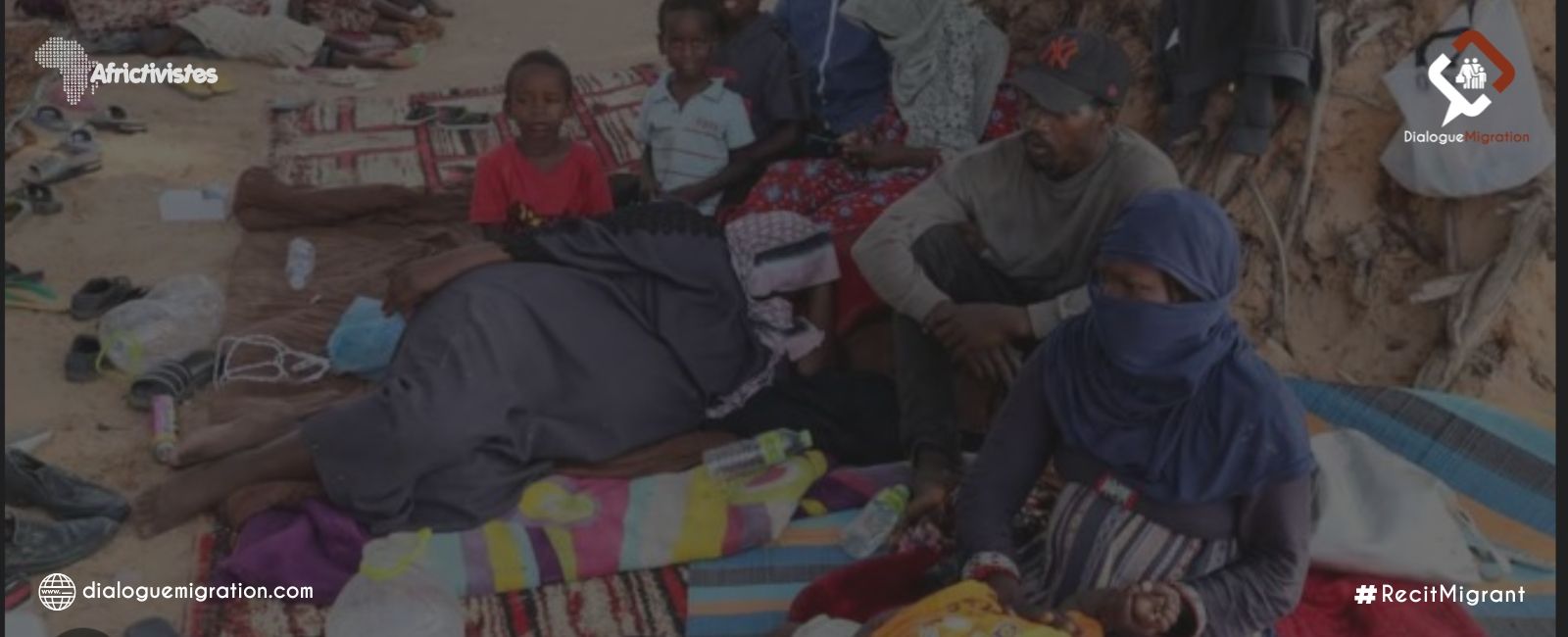

Sfax, a town where humanity is fading away
From 02 to 07 July 2023, about 700 sub-Saharan migrants were massively expelled by the Tunisian authorities from the seaside town of Sfax. These migrants, among them women and children, were taken to the Tunisian-Libyan border and left to fend for themselves in the desert without food or water.
In this article, Dialogue Migration collected the analyses of the academic Issa Yonlihinza, also a specialist in migration issues at GERMES (Research Group) at the Abdou Moumouni University of Niamey and that of Sophia Anne, member of the NGO Alarm Phone Méditerranée.
Migrants expelled from Sfax to the border between Tunisia and Libya
In a video shared by Human Rights Watch on its website and Youtube page, we see women, children and young men sitting in the desert, left to fend for themselves. This situation follows mass eviction operations carried out by the authorities of the city of Sfax. These sub-Saharan migrants are deported whether they are in a regular situation or not and “without any respect for legal procedures,” Human Rights Watch said.
The international human rights organization, Human Rights Watch, has called on the Tunisian authorities to put an end to collective expulsions and urgently allow humanitarian access to African migrants and asylum seekers already deported to a dangerous area (…). “Not only is it unacceptable to mistreat people and abandon them in the desert, but collective expulsions are also contrary to international law,” the NGO said.
Worse, according to Alarm Phone Méditerranée a network of activists that aims to support the mobility of people crossing the Mediterranean, migrants had to walk on foot to reach villages, then were arrested. “People walked dozens of kilometers to villages before being arrested and deported again. With each passing moment, the situation of deported migrants is deteriorating and every day the toll is increasing,” deplores Sophia Anne, a member of the Alarm Phone network.
Reasons behind these mass expulsions
According to Human Rights Watch, deportations of migrants by Tunisian authorities began as early as July 2, 2023. They expelled about 500 to 700 people from the city of Sfax.
Everything started, according to the testimonies, from a fight between a young Cameroonian and another Tunisian that led to the death of the latter. Analyzing the situation, Dr. Issa Yonlihinza, a specialist in migration issues at GERMES, said that “the Tunisian authorities have taken advantage of this situation to hide their inability to respond or meet the challenges they face”.
“Also,” he continues, “migration was previously welcomed in Libya and Algeria. Migration has also increased activities in sparsely populated areas. Whenever states have internal problems, migrants become scapegoats and politicians pit citizens against migrants.”
Tunisia’s political instability is a deadlock for President Kais Saied. He (Kais Saied) dissolved parliament and the government in July 2021, and has since ruled by decree. Saied has justified his actions by the need to fight corruption and government inefficiency, but Tunisia’s political class accuses him of establishing authoritarian rule.
According to academic Yonlihinza, Tunisia, a politically unstable country, acts on behalf of European states: “The Tunisian state acted under pressure from European countries, more precisely from Italy,” says Dr. Yonlihinza.
According to him, European countries “have pushed African countries to put in place national policies to regulate the flow of migration, as part of the externalization of their borders since the collapse of the Libyan state”. Tunisia’s role in this ballet has been delayed by the various movements of political instability it has experienced.
Difficulty in having the exact number of expelled migrants
According to Alarm Phone Mediterranean, it is difficult to give the exact number of migrants who have been deported. “We have been contacted by groups of several hundred people, both on the Libyan border and on the Algerian border, but we know that these figures are not representative of reality. Many civil society organizations and solidarity citizens are in contact with other groups,” he said.
In addition, according to a member of the organization, many people report that their phones were broken by the Tunisian authorities during their arrests. “So, we can imagine that there are hundreds of other people in the desert, with whom contact is impossible,” says Sophia Anne. However, Alarm Phone Méditerranée draws attention to the figures that are given by the Tunisian authorities. “We must be wary of the figures provided by the authorities,” she warns.
On July 5, 2023, the elected deputy of the city of Sfax, Moez Barkallah, said on the Midi Show that nearly 1000 people were deported per day since the Muslim feast of Sacrifice i.e.l Eid El Idha. The Tunisian authorities have an interest in inflating the figures for these deportations in order to win the support of part of the population, but also to show European countries that they take seriously the role of border guards that the European Union has assigned to them.”
Humanitarian organizations face challenges in accessing migrants
Since the beginning of the operation to expel migrants from Tunisia, humanitarians have struggled to access the sites where migrants are returned. “We feel completely helpless. We receive distress calls from people who are completely dehydrated, who fear for their lives, who have nowhere else to go or who are caught in the crossfire of the Tunisian and Libyan or Algerian authorities. The border areas where these people are located are military zones to which access is strictly prohibited and citizen solidarity is therefore very difficult, if not impossible, to implement. However, this local solidarity is not lacking! Many people want to help but cannot, due to the inaccessibility of people and the criminalization of any form of solidarity with migrants. The situation is too serious for us to give up. Together with Tunisian civil society, we will continue to respond to distress calls until all people are brought back to safety and their rights respected. We will continue to denounce these inhumane practices and the hardening of border outsourcing policies in Tunisia,” concludes Sophia Anne.
Sub-Saharan migrants saw their situations deteriorate with the speech of Tunisian President Kais Saied. A racist speech held on February 21, 2023. Remarks that were quickly condemned by the African Union and international human rights organizations.


